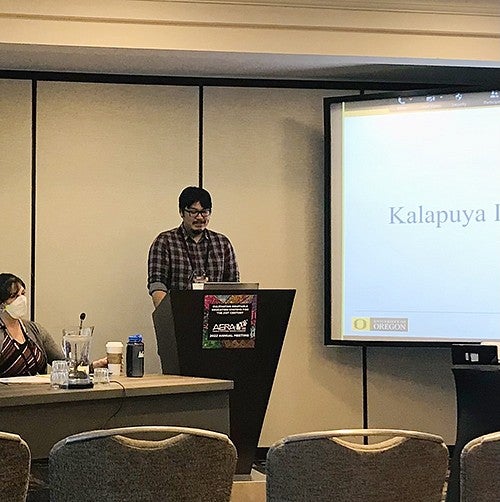
Faculty Mentorship Inspires Impactful Research by Doctoral Student
Quantitative Research Methods in Education Program Doctoral Student Taiyo Itoh Receives Prestigious Dissertation Award
For Taiyo Itoh, doctoral student in the College of Education, a powerful combination of passion, knowledge, mentorship, and collaboration point the way to a promising future and scholarship that will make a difference.
Itoh, currently in his fifth year of the Quantitative Research Methods in Education (QRME) program, has had a love of education since an early age. Growing up in Japan, he says, “school was a place I loved and where I felt safe.” Today, he is passionate about ensuring this sense of safety and opportunity for all students, particularly multilingual and historically marginalized populations.
Pursuing his interest in multicultural education, Itoh moved abroad in 2017 and completed a master’s degree at the University of Alaska Fairbanks. His desire to further develop skills in quantitative research methods while prioritizing a focus on equity, policy, and promoting multicultural education, then led him to the University of Oregon and the work of Associate Professor Ilana Umansky.
“I applied for the program because of Ilana’s research,” said Itoh, “but I wasn’t sure what to expect.” The two have worked together every term since Itoh began the program and have developed a relationship not only as advisor and advisee, but as close collaborators.
“As a faculty member, a primary aspiration—and joy—of mine is to work with doctoral students whose intellect, experience, passion, and skills push me as a scholar and thinker,” said Umansky. “Taiyo is just that.”
Their most impactful collaboration, Itoh said, is a set of papers and briefs related to how and when Indigenous students in the U.S. are classified as eligible for federal Title III (typically known as “English learner”) resources and services.
Federal law defines English learner eligibility differently for Indigenous, compared to non-Indigenous students, allowing for broader entry into the category and its accompanying resources and services. Their research found a significant disconnect between this policy and its implementation at the state and local level, and that many leaders in English learner education had little understanding of the federal law and weak engagement with Indigenous Tribes and communities. This reflects a potential loss of opportunities for Indigenous students to receive services, and for communities to receive funding which could be used for bilingual and language revitalization programs.
Itoh and Umansky published two papers about this research, which they also presented through meetings and a webinar in partnership with the National Indian Education Association and had the opportunity to share with the Office of English Language Acquisition at the U.S. Department of Education. “People weren’t paying much attention to this policy before, but now they are starting to talk about it,” said Itoh.
Itoh’s dissertation will explore similar research questions related to promoting multicultural education and supporting students who are classified as English learners through two papers. This year, he received a prestigious American Educational Research Association/National Science Foundation dissertation grant to support his research exploring the impact of peers on English learners’ learning environments.
“This area of research is still developing and there is no consensus on peer-related issues,” said Itoh. His goal is to understand who these students’ peers are, and what kind of role peers could play in their success. Some previous studies have found that having peers from similar backgrounds can have a positive impact on academic and social outcomes, and that having students with similar academic achievement records helps mitigate educators’ challenges in teaching those students.
“However,” said Itoh, “these findings are in tension with some others. Is it better for English learner students to be with one another, or to have increased access to their English-speaking peers?” The separation of these groups could result in a sense of segregation or English learner students being “trapped” in certain courses. To explore these questions, Itoh will use secondary school course-taking data from Michigan, Oregon, and Pennsylvania.
Itoh says that Umansky encourages him to engage critically with these issues. “She encourages me to think about nuance. It’s not simple—in policy research there is no single right answer, and the effect of a policy is not the same for everyone. I appreciate the time I can spend with her thinking through complex questions together. It’s fun, and it also helps me develop as a researcher.”
The admiration goes both ways. “In his dissertation,” said Umansky, “Taiyo is using methods that well surpass what I have done.” In addition to his exceptional skills in both qualitative and quantitative methods, “Taiyo is deeply ethical and generous. He holds students, their families, and their communities at the center of his work.”
Looking to the future, Itoh plans to pursue his passions for both research and teaching. He will continue to focus on students who are culturally and linguistically diverse and hopes to impart his knowledge to future generations of scholars as a university-based faculty researcher. Umansky offers her resounding support: “in the years to come, I see him as a leader in this field, working with his own students to impart his gifts.”
